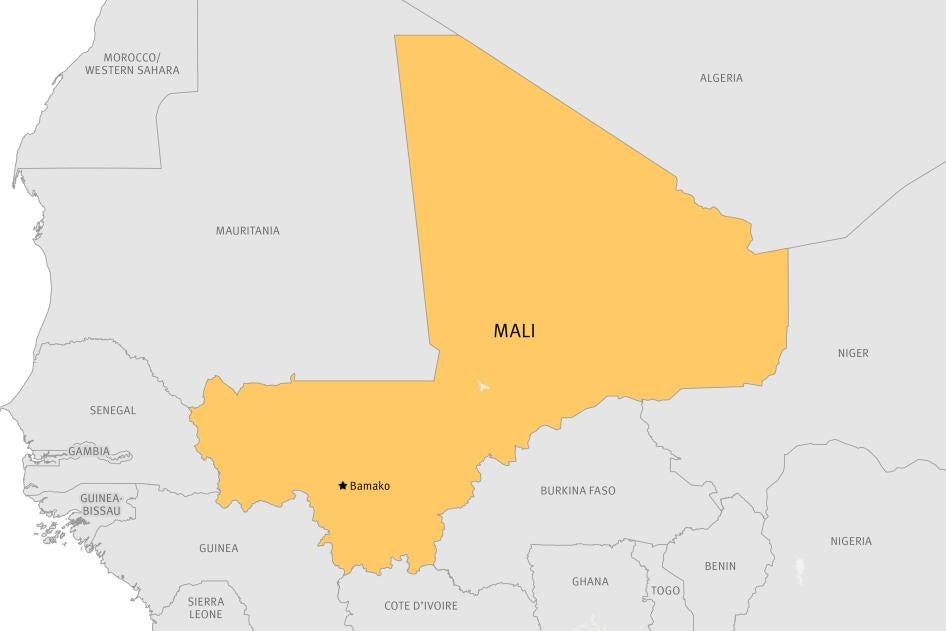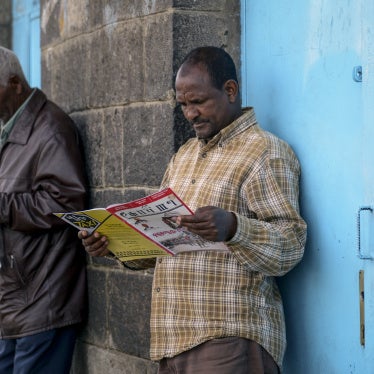(Nairobi) – Mali government security agents allegedly tortured six men who were held incommunicado in unauthorized detention facilities in September and October 2021, Human Rights Watch said today. Malian authorities should promptly and impartially investigate the torture allegations and respect due process in the cases against the men, who on November 3 were charged with plotting a coup against Mali’s transitional government.
Government security agents took the men into custody between September 6 and October 4 and allegedly subjected them to electric shocks, waterboarding, and repeated beatings to extract confessions and other information. Lawyers for the detainees, Malian human rights actors, and other sources described the torture and raised several due process concerns, including the investigating judge’s refusal to allow the men to receive medical and psychological treatment.
“Torture and other ill-treatment should never be used, anywhere, on anyone, in any situation,” said Corinne Dufka, Sahel director at Human Rights Watch. “Mali’s authorities should immediately open an investigation into these allegations and ensure respect for due process for this case going forward.”
Human Rights Watch spoke by telephone with 13 people with knowledge of the detainees’ allegations, including lawyers, family members, members of Mali’s independent Human Rights Commission (Commission Nationale des Droits de l’Homme, CNDH), local rights organizations, and foreign diplomats. Human Rights Watch also viewed photographs of two of the suspects, showing apparent evidence of physical mistreatment.
The alleged mistreatment took place within the headquarters of the Directorate of State Security (Direction générale de la sécurité d'Etat, DGSE), Mali’s intelligence service, and, to a lesser extent, in the Sundiata Keïta military camp in the Kati suburb of the capital, Bamako. Both are unauthorized detention facilities. People close to the detainees’ families said the authorities had refused to acknowledge the men’s presence in these detention facilities for up to two months. Denying the whereabouts of a person in government custody is an enforced disappearance under the Convention against Enforced Disappearance, to which Mali is a party.
All six detainees reportedly suffered mistreatment to varying degrees. People who had interviewed the men said that this included repeated shocks to the extremities, chest, and genitals with what some sources believed were electroshock weapons, referred to as "tasers." They also experienced simulated drowning, or “waterboarding,” by submerging the head in a bucket or, in one case, in the Niger River; injections with unknown substances; being stabbed with sharp objects; severe beating; being put in stress positions including having their wrists and ankles tied tightly for hours at a time; and being deprived of sleep, isolated in small cells, and forced to stare at bright lights.
The men were also reportedly subjected to psychological torture. They were threatened with death including by simulated execution, told that family members would be harmed, and, in one case, forced to watch another detainee being mutilated. At least two detainees reportedly lost consciousness from the mistreatment and one continues to urinate blood. Some detainees reportedly said they had diminished vision as a result of being forced to stare at bright lights.
One credible source who had interviewed the detained men said, “They all suffered mistreatment, but one told me how state agents tied him to a chair, injected him with a substance; hogtied, stripped, and electrocuted him, all over his body, again and again; laid him on the ground where state agents stood on his back and beat him, and submerged his head into water.”
Two sources who met with the detainees described observing physical signs of mistreatment on the legs, feet, and in the genital area of some of them. “One of the victims told me the torture made him regret ever being born,” one source said. “These men need medical and psychological care for the hell they went through.”
On November 5, the public prosecutor from Bamako’s high court announced charges against the six men for conspiracy and plotting to destabilize the government. The accused are army Col. Kassoum Goïta; Senior Police Commissioner Moustapha Diakité; Chief Warrant Officer Abdoulaye Ballo; a former presidential adviser, Prof. Kalilou Doumbia; Sandi Ahmed Saloum, a businessman; and Issa Samaké.
The three security force members are detained in Camp 1 gendarme camp in Bamako, while the three civilians are being held in Bamako’s central prison, the Maison centrale d'arrêt (MCA).
Sources Human Rights Watch interviewed described several due process problems in the case. They include interrogating the detainees for up to two months without the presence of their lawyers; the inclusion in the dossier of information derived from torture; the refusal of the judge to authorize medical care of their own choice and psychological care for the detainees; the refusal of the investigating judge to provide the lawyers with a copy of the preliminary investigation; the failure to provide detainees with adequate food; the refusal to allow family visits; and depriving detainees of access to information via radio or reading materials.
Basic due process and fair trial rights are set out in the International Covenant on Civil and Political Rights (ICCPR), which Mali has ratified. The ICCPR and the Convention against Torture and Other Cruel, Inhuman or Degrading Treatment or Punishment both expressly prohibit anyone from being subjected to torture or ill-treatment and prohibit the use of evidence so obtained in legal proceedings.
The Principles and Guidelines on the Right to a Fair Trial and Legal Assistance in Africa (“African Fair Trial Principles”) of the African Commission on Human and Peoples’ Rights state that anyone deprived of their liberty should “be held in an officially recognized place of detention.” The African Fair Trial Principles also provide that a fair hearing includes “an entitlement to have a party’s rights and obligations affected only by a decision based solely on evidence presented to the judicial body.”
“Malian security force members found responsible for torture, regardless of rank, should be appropriately prosecuted to end the practice,” Dufka said. “The United Nations and the African Union should press the Malian authorities to promptly investigate the alleged mistreatment.”









